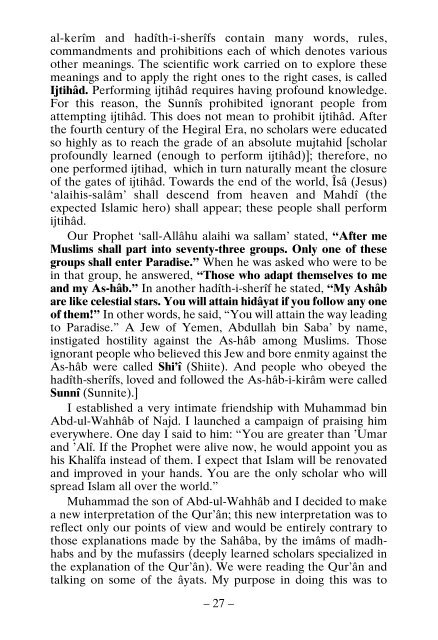Confessions Of A British Spy
Muhammad of Najd was the sort I had been looking for. For his scorn for the time’s scholars, his slighting even the (earliest) four Khalîfas, his having an independent view in understanding the Qur’ân and the Sunna were his most vulnerable points to hunt and obtain him. So different this conceited youngster was from that Ahmed Efendi who had taught me in Istanbul! That scholar, like his predecessors, was reminiscent of a mountain. No power would be able to move him. Whenever he mentioned the name of Abû Hanîfa, he would stand up, go and make an ablution. Whenever he meant to hold the book of Hadîth named he would, again, make an ablution. The Sunnîs trust this book very much. Muhammed of Najd, on the other hand, disdained Abû Hanîfa very much. He would say, “I know better than Abû Hanîfa did. In addition, according to him, half of the book of wrong.
Muhammad of Najd was the sort I had been looking for. For
his scorn for the time’s scholars, his slighting even the (earliest)
four Khalîfas, his having an independent view in understanding
the Qur’ân and the Sunna were his most vulnerable points to hunt
and obtain him. So different this conceited youngster was from
that Ahmed Efendi who had taught me in Istanbul! That scholar,
like his predecessors, was reminiscent of a mountain. No power
would be able to move him. Whenever he mentioned the name of
Abû Hanîfa, he would stand up, go and make an ablution.
Whenever he meant to hold the book of Hadîth named he would, again, make an ablution. The Sunnîs trust this book
very much.
Muhammed of Najd, on the other hand, disdained Abû Hanîfa
very much. He would say, “I know better than Abû Hanîfa did.
In addition, according to him, half of the book of wrong.
Create successful ePaper yourself
Turn your PDF publications into a flip-book with our unique Google optimized e-Paper software.
al-kerîm and hadîth-i-sherîfs contain many words, rules,<br />
commandments and prohibitions each of which denotes various<br />
other meanings. The scientific work carried on to explore these<br />
meanings and to apply the right ones to the right cases, is called<br />
Ijtihâd. Performing ijtihâd requires having profound knowledge.<br />
For this reason, the Sunnîs prohibited ignorant people from<br />
attempting ijtihâd. This does not mean to prohibit ijtihâd. After<br />
the fourth century of the Hegiral Era, no scholars were educated<br />
so highly as to reach the grade of an absolute mujtahid [scholar<br />
profoundly learned (enough to perform ijtihâd)]; therefore, no<br />
one performed ijtihad, which in turn naturally meant the closure<br />
of the gates of ijtihâd. Towards the end of the world, Îsâ (Jesus)<br />
‘alaihis-salâm’ shall descend from heaven and Mahdî (the<br />
expected Islamic hero) shall appear; these people shall perform<br />
ijtihâd.<br />
Our Prophet ‘sall-Allâhu alaihi wa sallam’ stated, “After me<br />
Muslims shall part into seventy-three groups. Only one of these<br />
groups shall enter Paradise.” When he was asked who were to be<br />
in that group, he answered, “Those who adapt themselves to me<br />
and my As-hâb.” In another hadîth-i-sherîf he stated, “My Ashâb<br />
are like celestial stars. You will attain hidâyat if you follow any one<br />
of them!” In other words, he said, “You will attain the way leading<br />
to Paradise.” A Jew of Yemen, Abdullah bin Saba’ by name,<br />
instigated hostility against the As-hâb among Muslims. Those<br />
ignorant people who believed this Jew and bore enmity against the<br />
As-hâb were called Shi’î (Shiite). And people who obeyed the<br />
hadîth-sherîfs, loved and followed the As-hâb-i-kirâm were called<br />
Sunnî (Sunnite).]<br />
I established a very intimate friendship with Muhammad bin<br />
Abd-ul-Wahhâb of Najd. I launched a campaign of praising him<br />
everywhere. One day I said to him: “You are greater than ’Umar<br />
and ’Alî. If the Prophet were alive now, he would appoint you as<br />
his Khalîfa instead of them. I expect that Islam will be renovated<br />
and improved in your hands. You are the only scholar who will<br />
spread Islam all over the world.”<br />
Muhammad the son of Abd-ul-Wahhâb and I decided to make<br />
a new interpretation of the Qur’ân; this new interpretation was to<br />
reflect only our points of view and would be entirely contrary to<br />
those explanations made by the Sahâba, by the imâms of madhhabs<br />
and by the mufassirs (deeply learned scholars specialized in<br />
the explanation of the Qur’ân). We were reading the Qur’ân and<br />
talking on some of the âyats. My purpose in doing this was to<br />
– 27 –


